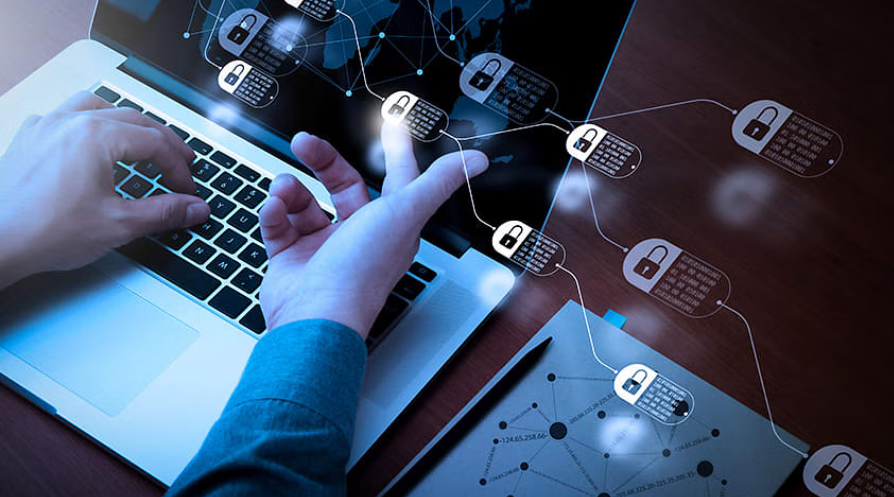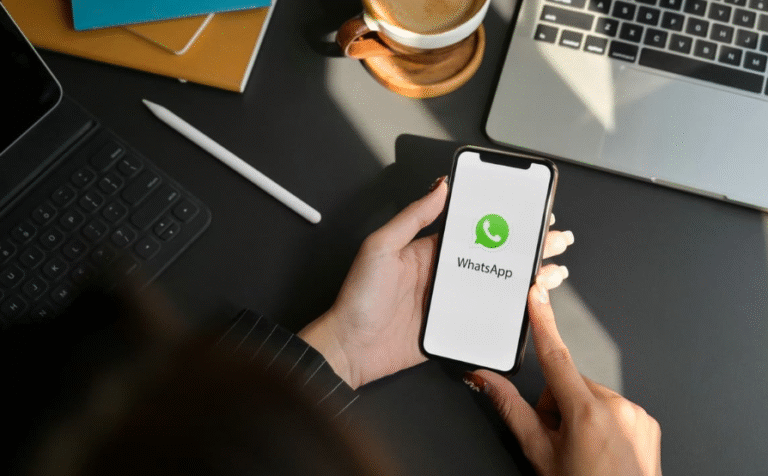Blockchain Beyond Cryptocurrency: Exploring Its Impact on Data Security and Privacy

Introduction
Blockchain technology has become synonymous with cryptocurrency, but its potential stretches far beyond digital currencies. While blockchain’s role in enabling decentralized digital currencies like Bitcoin and Ethereum is well-known, the technology is also proving to be a game-changer in areas like data security and privacy. By providing a secure, transparent, and decentralized way of storing data, blockchain is revolutionizing industries and addressing major concerns surrounding data integrity, access, and privacy protection.
In this article, we will explore how blockchain is transforming data security and privacy, its various applications, the benefits it offers, and the challenges that come with implementing blockchain in these fields.
What is Blockchain?
At its core, blockchain is a distributed ledger technology that records transactions in a secure, transparent, and immutable way. It works by creating blocks of data that are linked together in a chain, hence the name “blockchain.” These blocks are stored on a decentralized network of computers (also called nodes), ensuring that no single entity has control over the entire system. Once data is recorded in a block, it cannot be altered or deleted without the consensus of the network, making it highly resistant to tampering and fraud.
Key Features of Blockchain
- Decentralization: No single entity controls the blockchain network, making it resistant to censorship or manipulation.
- Immutability: Once information is added to a block, it cannot be changed or erased.
- Transparency: Transactions are visible to all participants in the network, enhancing trust.
- Security: Blockchain uses cryptographic techniques to secure data, making it difficult for hackers to alter or access private information.
See also: Jamaican TikToker ‘TT’ Goes Viral in Raunchy Video: The Story Behind the Trend
Blockchain’s Role in Data Security
Enhancing Data Integrity
One of the most significant impacts blockchain has on data security is its ability to ensure the integrity of the data stored on the network. In traditional systems, data can be altered or tampered with either by malicious actors or through human error. With blockchain, once data is recorded in a block, it is cryptographically linked to the previous block, creating an immutable record. This makes it virtually impossible to modify or delete data without being detected, providing a level of security that is unparalleled in traditional systems.
- Hash Functions: Blockchain uses cryptographic hash functions to ensure that each block contains a unique identifier, making it easy to detect any changes made to the data.
- Distributed Ledger: Data is replicated across multiple nodes in the network, ensuring that no single point of failure exists.
Prevention of Data Breaches
Data breaches are one of the most pressing concerns for businesses and consumers alike. With sensitive information such as passwords, financial data, and personal details being stored online, the threat of hacking and unauthorized access is ever-present. Blockchain’s decentralized nature makes it significantly more difficult for hackers to compromise data.
- Decentralized Storage: Because data is not stored in a centralized location, it is less vulnerable to attacks.
- End-to-End Encryption: Blockchain networks use end-to-end encryption to secure data, ensuring that only authorized parties can access it.
Enhancing Authentication and Authorization
Blockchain technology can be used to improve authentication and authorization mechanisms, helping businesses ensure that only authorized users can access specific data. By using blockchain-based identity management systems, individuals can securely manage their personal data without relying on third parties.
- Self-Sovereign Identity (SSI): With blockchain, individuals can have control over their digital identity, which they can share with others on a need-to-know basis.
- Multi-Factor Authentication: Blockchain can integrate multi-factor authentication systems, making it more difficult for unauthorized users to gain access to sensitive data.
Blockchain and Privacy: A New Paradigm
In the digital age, privacy concerns have become a central issue for individuals and organizations. Blockchain, with its transparent and decentralized nature, offers an alternative approach to managing personal data while maintaining privacy.
Protection Against Unauthorized Data Access
Blockchain ensures that data is only accessible to those who have the appropriate permissions. This is particularly valuable in industries where sensitive data—such as healthcare records or financial transactions—needs to be protected.
- Data Encryption: Blockchain employs encryption methods that ensure only authorized users can access and read the data.
- Zero-Knowledge Proofs: These cryptographic methods allow one party to prove to another that they know a piece of information without revealing the information itself, enhancing privacy.
Data Minimization and Ownership
Blockchain allows individuals to retain control over their data by enabling them to decide what personal information is shared and with whom. This concept, known as data minimization, helps reduce the amount of personal data stored in centralized databases, lowering the risk of exposure in case of a breach.
- Decentralized Applications (dApps): dApps on blockchain platforms can ensure that users only provide the minimum amount of personal information needed for a specific service.
- Permissioned Blockchain: Unlike public blockchains, permissioned blockchains allow organizations to control who can access the network, providing an extra layer of privacy.
Compliance with Data Privacy Regulations
With stringent data privacy regulations like the GDPR (General Data Protection Regulation) and CCPA (California Consumer Privacy Act) in place, businesses must ensure that they are handling personal data in compliance with these laws. Blockchain can help companies comply by giving users more control over their data and providing a transparent record of how their information is being used.
- Immutable Audit Trail: Blockchain’s transparent and immutable nature creates an audit trail, allowing companies to prove that they are following data protection laws.
- Right to be Forgotten: Although blockchain’s immutability can pose challenges to the right to erasure (or the “right to be forgotten” under GDPR), some projects are exploring ways to address this issue by using off-chain storage and linking it to blockchain records.
Applications of Blockchain in Data Security and Privacy
Supply Chain Security
Blockchain can provide secure and transparent tracking of goods and materials as they move through the supply chain. By recording every transaction in a blockchain, companies can verify the authenticity and origin of products, ensuring that customers receive genuine goods.
- Provenance Tracking: Blockchain’s ability to track the entire history of a product from its origin to the point of sale ensures that consumers are purchasing products that meet specific standards.
Healthcare Data Security
The healthcare industry handles vast amounts of sensitive data, including patient medical records, which are prime targets for hackers. Blockchain can provide a secure and efficient way to manage these records, ensuring that they are only accessible to authorized medical personnel.
- Interoperability: Blockchain can facilitate the sharing of healthcare data between different institutions while maintaining security and privacy.
- Patient Consent Management: Blockchain can help manage patient consent for sharing medical data, giving patients more control over their information.
Financial Sector and Blockchain
The financial industry has already embraced blockchain for cryptocurrency transactions, including real-time tracking of metrics like the ADA to EUR exchange rate and other crypto-fiat rates, but the technology also has the potential to enhance data security and privacy in areas like banking, insurance, and asset management.
- Secure Transactions: Blockchain ensures that financial transactions are secure, transparent, and tamper-proof.
- Smart Contracts: Smart contracts on blockchain networks can automatically execute and enforce terms, reducing the risk of fraud.
Challenges and Limitations of Blockchain in Data Security and Privacy
Scalability Issues
One of the key challenges facing blockchain technology is scalability. As the number of users and transactions grows, the blockchain network may become slower and more cumbersome. Solutions like sharding and layer-two protocols are being explored to address these issues, but scalability remains a concern.
Energy Consumption
Many blockchain networks, especially those that rely on proof-of-work (PoW) consensus mechanisms, require significant computational power, which leads to high energy consumption. This environmental impact has raised concerns, and alternative consensus mechanisms like proof-of-stake (PoS) are being developed to mitigate this issue.
Legal and Regulatory Uncertainty
While blockchain technology offers numerous benefits for data security and privacy, it also presents challenges in terms of legal and regulatory frameworks. Laws and regulations are still evolving, and businesses must navigate an uncertain landscape when implementing blockchain solutions.
Conclusion
Blockchain technology has the potential to revolutionize data security and privacy by providing decentralized, secure, and transparent systems that protect sensitive information from unauthorized access and tampering. From improving data integrity to giving individuals greater control over their personal data, blockchain is paving the way for a new paradigm in how we store and share information.
While there are still challenges to overcome—such as scalability, energy consumption, and regulatory uncertainty—the ongoing development of blockchain solutions continues to promise a more secure and private digital future.
FAQs
1. How does blockchain enhance data security?
Blockchain enhances data security through its decentralized nature, ensuring that no single entity can alter or tamper with the data. It uses cryptographic techniques to secure data and makes it virtually impossible to change data once it’s recorded on the blockchain.
2. Can blockchain be used to protect personal data?
Yes, blockchain can be used to protect personal data by encrypting it and giving individuals control over how their data is shared. It also supports privacy-enhancing techniques such as zero-knowledge proofs.
3. What is the impact of blockchain on privacy laws like GDPR?
Blockchain’s transparency can pose challenges to privacy laws like the GDPR, particularly regarding the “right to be forgotten.” However, blockchain’s immutability can provide companies with an audit trail that proves compliance with data protection laws.
4. How does blockchain prevent data breaches?
Blockchain prevents data breaches by decentralizing the storage of data and using cryptographic encryption to secure transactions. Since there is no central point of failure, it is much harder for hackers to compromise the system.
5. What are the challenges in implementing blockchain for data security?
Challenges include scalability issues, high energy consumption, and legal/regulatory uncertainty. Solutions like sharding and proof-of-stake are being developed to address scalability and environmental concerns.
6. What industries can benefit from blockchain in terms of data security?
Industries such as healthcare, finance, supply chain management, and insurance can benefit from blockchain’s ability to secure sensitive data, ensure transparency, and reduce fraud.






